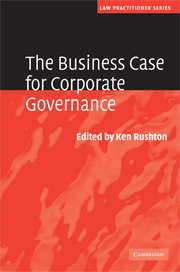Book contents
- Frontmatter
- Contents
- List of contributors
- Acknowledgements
- Introduction
- 1 The role of the board
- 2 The role of the Chairman
- 3 The role of the non-executive director
- 4 The role of the Company Secretary
- 5 The role of the shareholder
- 6 The role of the regulator
- 7 Directors’ duties
- 8 What sanctions are necessary?
- 9 Regulatory trends and their impact on corporate governance
- 10 Corporate governance and performance: the missing links
- 11 Is the UK model working?
- Index
- References
3 - The role of the non-executive director
Published online by Cambridge University Press: 23 June 2009
- Frontmatter
- Contents
- List of contributors
- Acknowledgements
- Introduction
- 1 The role of the board
- 2 The role of the Chairman
- 3 The role of the non-executive director
- 4 The role of the Company Secretary
- 5 The role of the shareholder
- 6 The role of the regulator
- 7 Directors’ duties
- 8 What sanctions are necessary?
- 9 Regulatory trends and their impact on corporate governance
- 10 Corporate governance and performance: the missing links
- 11 Is the UK model working?
- Index
- References
Summary
Introduction
I am frequently asked: ‘What is the role of a non-executive director (NED)?’ In 1996, when we were undertaking research prior to launching the Cranfield NED Seminar, the answer was far from clear. We were told jokes such as: ‘What's the difference between an NED and a supermarket shopping trolley?’ Answer: ‘One can hold large amounts of food and drink while the other is useful for taking the shopping home and occasionally has a mind of its own.’
This lack of awareness, in conjunction with recent corporate scandals and growing shareholder activism, has put a greater focus on the role of the NED. The role was significantly clarified by the Higgs Report in 2003. Today I believe the answer to the question is much clearer and can be best summed up by the following quotation: ‘The fundamental job of NEDs is to see that the company is properly run, but not to run the company.’ I am unaware of the source of the quotation, but I believe it describes accurately and appropriately what is a complex and demanding role.
The importance of the NED has changed significantly over time. This quotation sums up how the role used to be viewed:
Coote got me in as a director of something or other. Very good business for me – nothing to do except go down to the City once or twice a year to one of those hotel places and sit around a table where they have some very nice new blotting paper. Then Coote or some clever Johnny makes a speech simply bristling with figures, but fortunately you needn't listen to it – and I can tell you, you often get a jolly good lunch out of it.
- Type
- Chapter
- Information
- The Business Case for Corporate Governance , pp. 50 - 66Publisher: Cambridge University PressPrint publication year: 2008



